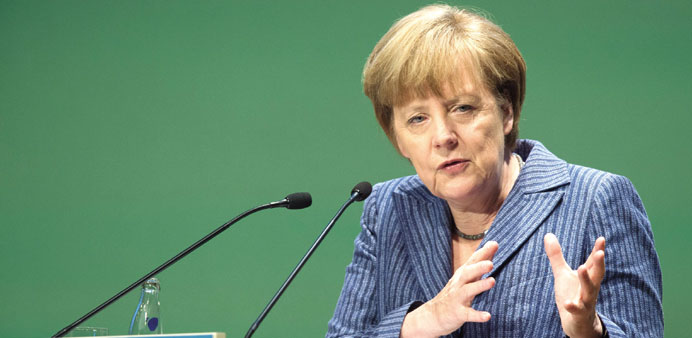Merkel: (The BND’s) ability to carry out its duties in the face of international terrorism threats is done in co-operation with other intelligence agencies, and that includes first and foremost the NSA.
DPA/Reuters/Berlin
Chancellor Angela Merkel has called for an end to spying among friendly countries amid allegations that Berlin security services had teamed up with the US National Security Agency (NSA) to snoop on Germany’s neighbours and the European Commission.
She was echoing remarks she made in 2013 when revelations emerged that the NSA had tapped her mobile phone, as a result straining ties between Washington and Berlin.
Spying on behalf of the NSA has upset many in Germany where surveillance is a sensitive issue due to abuses by the Nazis and East German Stasi.
Revelations by former NSA contractor Edward Snowden that Washington carried out large-scale electronic espionage in Europe have provoked outrage in Germany.
But speaking in Berlin yesterday, Merkel said that Germany’s intelligence services needed to continue to work closely with the NSA to ensure the safety of their citizens.
“We’ve quite correctly got controls on the BND in parliament and I consider that to be absolutely essential,” Merkel said. “But on the other hand, intelligence agencies are working to ensure the public’s safety and the German government will do everything it can to ensure that it can carry out its job.”
“And this ability to carry out its duties in the face of international terrorism threats is done in co-operation with other intelligence agencies, and that includes first and foremost the NSA,” the Chancellor said.
Merkel said spy agencies had to co-operate with each other but conceded there is “an innate tension” between freedom and security.
“Striking the right balance is my job,” she said, adding: “What has to be improved must be improved.”
Merkel’s spokesman also said the chancellor would be willing to co-operate with a parliamentary committee investigating alleged abuses in Europe by the NSA.
Merkel’s office has the oversight of the BND.
Interior Minister Thomas de Maiziere is due to appear before the parliamentary intelligence committee tomorrow.
De Maiziere, a close Merkel ally and her chief of staff from 2005 to 2009, has faced calls to resign over the scandal.
He has denied he lied to parliament about Germany’s intelligence co-operation with the NSA.
The chancellery has said it had known of the NSA interest in spying on European defence firms since 2008, even though parliament was told in 2014 it had no information about that.
The head of Germany’s foreign intelligence service (BND) Gerhard Schindler refused at a conference on the threat posed by Islamic terrorism to comment specifically on the spying allegations, but he denied that the BND had become a willing tool of the NSA.
“I emphatically reject the accusations of treason,” he said at a panel discussion in Berlin. “It’s totally absurd.”
He also said Germans had the wrong impression about the co-operation with the NSA. “The BND isn’t a compliant tool of the United States.”
“International co-operation is essential,” he said, saying for example, information on the militant terror group Islamic State could never be good enough.
German Vice-Chancellor Sigmar Gabriel has also demanded a full and open investigation into the allegations, which have included claims that both the German and United States intelligence services had been spying on companies in Germany as well on France and Austria.
Gabriel, who also heads the Social Democrats, the junior member of Merkel’s conservative-led coalition, warned that the scandal involving Germany’s intelligence service could trigger “a very severe shock” in the nation’s political system.
He said that Merkel has assured him on two occasions that there was no evidence the German security services had spied on the nation’s industrial sector.
Lithuania detains Russian spy suspect
Lithuanian prosecutors said yesterday that they had detained a Russian citizen suspected of spying, in the latest Cold War-style incident as tensions spiral between the West and Russia.
The suspect is a Russian FSB security service agent who sought to “penetrate governing institutions, law-enforcement and intelligence services”, the prosecutor’s office said.
The man – born in 1977 and identified only as NF – was detained on Wednesday and was ordered held for three months by a court the following day.
He could face up to 15 years in prison if convicted of espionage.
Lithuania’s intelligence agency said the arrest had thwarted an “attempt to access information known only to Lithuanian leaders with the aim of manipulating and influencing decision-making processes at the top level”.
It is the fourth criminal case made public by Lithuania – an EU and Nato member since 2004 – in less than a year involving spying for Russia or Belarus. Previous arrests included those of a former employee of a state-owned air traffic control company.
Lithuania’s intelligence agency also said it kicked out three Russian spies last year, adding that Moscow was increasingly interested in the Baltic state’s military infrastructure.
Russian activity in Ukraine and military manoeuvres in the region have triggered concern that Moscow could attempt to destabilise the Baltic countries that were in its orbit during Soviet times.

